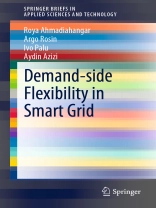This book highlights recent advances in the identification, prediction and exploitation of demand side (DS) flexibility and investigates new methods of predicting DS flexibility at various different power system (PS) levels. Renewable energy sources (RES) are characterized by volatile, partially unpredictable and mostly non-dispatchable generation. The main challenge in terms of integrating RES into power systems is their intermittency, which negatively affects the power balance. Addressing this challenge requires an increase in the available PS flexibility, which in turn requires accurate estimation of the available flexibility on the DS and aggregation solutions at the system level. This book discusses these issues and presents solutions for effectively tackling them.
Jadual kandungan
Challenges of Smart Grids Implementation.- On the Concept of Flexibility in Electrical Power Systems: Signs of Inflexibility.- Investigating different sources of Flexibility in Power System.- Forecasting Available Demand Side Flexibility.- New Approaches for Increasing Demand Side Flexibility.
Mengenai Pengarang
Dr. Roya Ahmadiahangar received her M.S. and Ph.D. degrees in power systems engineering from the Babol University of Technology, Babol, Iran, in 2009 and 2014, respectively. She is a Postdoctoral researcher with the Department of Electrical Power Engineering and Mechatronics, Tallinn University of Technology. Her research interests Include integration of DER in smart grids, demand response, AI applied to smart grid and planning and management of power systems.Prof. Argo Rosin received his Dipl. Eng, M. Sc. and Dr. Sc. techn. Degrees in electrical engineering from Tallinn University of Technology, Tallinn, Estonia, in 1996, 1998 and 2005, respectively. He is presently a Professor in the Department of Electrical Power Engineering, Tallinn University of Technology. He has published several books and over 80 scientific papers on smart grids, including energy management, control and diagnostic systems development and is the holder of a Patent in this field. His research interests include modelling and simulation of power management and industrial control systems. He is a Chartered Engineer, and member of Estonian Association of Engineers.
Prof. Ivo Palu received his Ph D in electrical engineering from Tallinn University of Technology, Tallinn, Estonia, in 2009. He is presently a Professor and Head of Department of the Department of Electrical Power Engineering, Tallinn University of Technology. His research interests include Integration of renewable energy sources into electrical networks including co-operation of power units, power quality measurements and research.
Prof. Aydin Azizi holds a Ph D degree in Mechanical Engineering and currently serves as a Senior Lecturer at the Oxford Brookes University, also he conducts SMSCP certification program as an official Siemens certified mechatronics instructor at German University of Technology in Oman. His current research focuses on investigating and developing novel techniques to model, control andoptimize complex systems. Prof. Azizi’s areas of expertise include Control & Automation, Artificial Intelligence and Simulation Techniques. Prof. Azizi is the recipient of the National Research Award of Oman for his AI-focused research, DELL EMC’s “Envision the Future” completion award in Io T for “Automated Irrigation System”, and ‘Exceptional Talent’ recognition by the British Royal Academy of Engineering.












